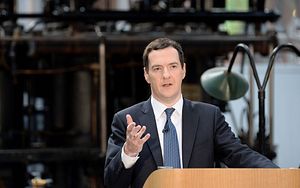George Osborne will be grinning ear to ear when Chinese President Xi Jinping leaves London on October 23, after a four-day state visit. China has chosen London as the first international financial hub to issue renminbi-denominated Chinese sovereign debt. According to the Financial Times, Chinese President Xi Jinping, on his trip to London next week, will announce that Chinese Treasury bonds will be issued in London. Osborne, the British chancellor of the exchequer (treasury chief), has sought to turn London into the primary western hub for financial interactions within Chinese markets.
Back in 2013, under his oversight, China and the United Kingdom unveiled a landmark agreement that would allow U.K.-based financial institution to directly invest in Chinese equity and debt markets. Next week’s announcement on sovereign debt will further cement London’s place as perhaps the most China-friendly financial hub in the West and help China popularize the use of its currency outside of its borders.
The news that China would issue sovereign debt in London isn’t surprising. Reports late in September noted that the People’s Bank of China (PBOC) was set to begin issuing short-term renminbi-dominated debt in London. “I have strongly supported China’s efforts to increase the international use of the renminbi,” Osborne noted then, at the conclusion of the U.K.-China Economic and Financial Dialogue in Beijing.
The strategic logic of the deal makes sense given the current bilateral climate between David Cameron’s Tory government and China’s leadership. Britain has made no secret of its desire to attract Chinese investment. The current government in the U.K. has gone as far as to defy the warnings of the United States in approaching China, as encapsulated in the row that ensued after the U.K. signed up to China’s new Asian Infrastructure Investment Bank (AIIB) as a founding member despite U.S. protests about the bank’s questionable environmental and governance standards.
For China, this deal will mark a major milestone in the renminbi’s arrival as a major currency on the world stage. This will be the first time that renminbi-denominated Chinese sovereign debt will be available outside of Chinese borders, opening up an international renminbi debt market. Osborne, more so than any other Western treasury chief, has made a point of emphasizing his bullishness about the Chinese economy, despite this summer’s equity market tremors. “Britain and China — we will stick together,” he declared triumphantly in Beijing less than a month after China’s so-called “Black Monday.”
The development could help the incorporation of the renminbi into the International Monetary Fund’s Special Drawing Rights currency basket. The SDF basket currently includes the euro, the Japanese yen, the pound sterling, and the U.S. dollar. In August 2015, the IMF declared that it would delay its decision on the renminbi’s eligibility for SDR inclusion pending a determination of just how freely usable the currency is.
The renminbi is currently a managed float currency and controlled closely by the PBOC. Amid equity market volatility, the PBOC has repeatedly adjusted the value of the currency, initially pitching it as a “one-off depreciation.” Opening up an international market for renminbi-denominated sovereign debt could help balance worries that the renminbi is still too vulnerable to calculated political influence.
Beyond the fate of the renminbi, the agreement to issue government debt in London highlights the continuing rapprochement between the U.K. and China. In recent years, the Cameron government has been eager to sideline normative concerns such as human rights and China’s international behavior in other areas in pursuit of a broader and more profound commercial relationship.
Next week’s state visit for Xi Jinping will set the tone for the next chapter in the U.K.-China bilateral. Osborne, a longtime proponent of China’s accommodation into the highest echelons of global commerce, will be happy to see Xi announce China’s decision to issue renminbi-denominated debt in London. If the Chinese foreign ministry’s rhetoric is to be believed, we’re about to witness the start of a “golden era” in U.K.-China ties.
































